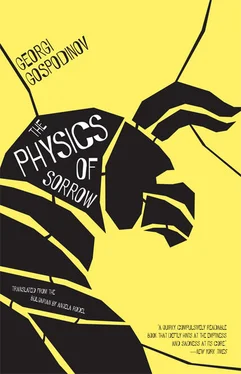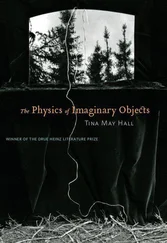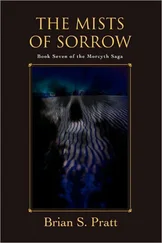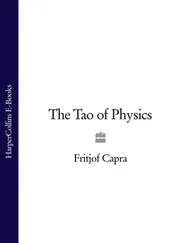Step right up, ladies and gents. A child with a bull’s head. A never-before-seen wonder. The little Minotaur from the Labyrinth, only twelve years old. You can eat up your fiver, drink up your fiver, or spend your fiver to see a marvel you’ll talk about your whole life long.
According to my grandfather’s memory, he didn’t go in here. But now I’m at the Fair of this memory, I am he, and it irresistibly draws me in. I hand over my fiver, say farewell to the python and its deceitful twenty feet, to Agop’s ice-cold syrup, to the story of Nikolcho the prisoner-of-war, to the Armenian granny’s rock candy, Harry Stoev’s death grip, and sink into the tent. With the Minotaur.
From this point on, the thread of my grandfather’s memory stretches thin, yet doesn’t snap. He claims that he didn’t dare go in, yet I manage to. He’s kept it to himself. Since I’m here, in his memory, could I even keep going if he hadn’t been here before me? I’m not sure, but something isn’t right. I’m already inside the labyrinth, which turns out to be a big, half-darkened tent. What I see is very different from my favorite book of Greek myths and the black-and-white illustrations in which I first saw the Minotaur-monster. They have nothing in common whatsoever. This Minotaur isn’t scary, but sad. A melancholy Minotaur.
In the middle of the tent stands an iron cage about five or six paces long and a little taller than human height. The thin metal bars have begun to darken with rust. Inside there is a mattress and a small, three-legged stool at one end, while at the other — a pail of water and scattered hay. One corner for the human, one for the beast.
The Minotaur is sitting on the stool, with his back to the audience. The shock comes not from the fact that he looks like a beast, but that he is in some way human. Precisely his humanness is staggering. His body is boyish, just like mine.
The first down of adolescence on his legs, feet with long toes, who knows why I expected to see hooves. Faded shorts that reach his knees, a short-sleeved shirt. and the head of a young bull. Slightly disproportionate to the body, large, hairy, and heavy. As if nature had hesitated. And just dropped everything right in the middle between bull and man — nature got frightened or distracted. This head is not just a bull’s, nor just a human’s. How can you describe it, when the tongue is also pulled in two directions? The face (or snout?) — elongated; the forehead — slightly sloped backward, but nevertheless massive, with bones jutting out above the eyes. (Actually, it is not unlike the forehead of all the men in our family. At this point I unwittingly run my hand over my own skull.) His lower jaw is rather protruded, the lips quite thick. The bestial always hides in the jaw, it’s where the animal leaves us last. His eyes, due to the elongated face (or snout) that flattens out on the sides, are wide set. Over the whole facial area there is some brownish fuzz, not a beard, but fuzz. Only toward the ears and neck does this fuzz congeal into fur, the hair growing wild and in disarray. And yet he is more human than anything else. There is a sorrow in him, which no animal possesses.
Once the tent fills up, the man makes the Minotaur-boy stand. He gets up off the stool and for the first time looks at the crowd in the tent. His gaze wanders over us, he has to turn his head, given his obliquely set eyes. They seem to rest on me for a moment. Could we be the same age?
The man who herded us into the tent (his master and guardian) begins his tale. An odd mix of legend and biography, honed over the course of long repetitions at fairs. A story in which eras catch up with one another and intertwine. Some events happen now, others in the distant and immemorial past. The places are also confused, palaces and basements, Cretan kings and local shepherds build the labyrinth of this story about the Minotaur-boy, until you get lost in it. It winds like a maze and unfortunately I will never be able to retrace its steps. A story with dead-end corridors, threads that snap, blind spots, and obvious discrepancies. The more unbelievable it looks, the more you believe it. The pale and straight line — the only way I can retell it now, lacking the magic of that tale — goes roughly as follows.
Helio, the boy’s grandfather on his mother’s side, was in charge of the sun and the stars; in the evening he locked up the sun and drove the stars out into the sky, like driving a herd out to pasture. In the morning he gathered up his herd and let the sun out to graze. The old man’s daughter, Pasifette, the mother of this boy here, was kind and beautiful, she married a mighty king from somewhere way down there in the islands. This was long ago, even before the wars. It was a rich kingdom, the Lord God himself (their god, that is, the local one) drank whiskey with the king of the islands, they set store by each other, God even gave him a big bull with a pure white hide, which was a downright wonder to behold. So the years went by and God demanded that same bull as a sacrifice. But Old King Minyo (Minos, Minos. somebody yelled out) was feeling stingy and decided to pull a fast one on God and slaughtered another bull, again fat and well fed. But can you really pull a fast one on God? God found out, hit the roof, started blustering, saying, don’t pull this while-the-grass-grows-the-horse-starves business on me, now you’ll see who you’re messing with. He fixed it so that Minyo’s meek and loyal wife, Pasifette, sinned with that very same handsome stud of a bull. (Here a buzz of disapproval sweeps through the crowd.) And from this a child was born — a man in body, but a bull in countenance, with a bull’s head. His mother nursed him and cared for him, but that laughingstock King Minyo just couldn’t stomach the disgrace. He didn’t have the heart to kill the little baby-Minotaur, so he ordered it to be locked up in the basement of the palace. And that basement was a real labyrinth, a master stonemason made it so that once you go in, there’s no getting out. That mason must’ve been from around these parts, one of our boys, since here we’ve got the best, while those Greeks are lazy as sin. (A buzz of approval sweeps through the tent.) But afterward that poor old mason didn’t earn a red cent from the whole business, but that’s another story. They tossed the little boy inside, at the tender age of three, torn away from his mother and father. Just imagine what his poor angelic little soul must’ve suffered in that dark dungeon. (At this point, people began sniffling, even though they themselves did the exact same thing with their little snot-nosed brats, fine, so it wasn’t for eternity, they’d lock them up between the thick cellar walls only for an hour or two.) They tossed him there in the dark, the storyteller went on, the little guy cried day and night, calling for his mother. In the end, Pasifette begged one of those master masons who had made the labyrinth to sneak the boy out secretly, while they put a young bull in his place. But that’s not in the book, some know-it-all in the crowd chimes in. Let’s keep that between us, the storyteller says emphatically, so that old Cretan King Minyo doesn’t find out about the switch, ’cause he still doesn’t have the slightest inkling. And so they secretly freed the little boy with the bull’s head and again secretly loaded him onto a ship bound for Athens (the same one going to take the seven Athenian lads and lassies, supposedly for the Minotaur). The little Minotaur gets off in Athens, there an old fisherman finds him and hides him in his hut, looks after him for a year or two, and gives him to one of our boys, a shepherd, who goes down south in the winter to graze his herd of cattle, all the way to the Aegean. He took him, saying since he’ll never be able to live out in the open among people, hopefully the cattle will take him in as one of their own. Well now, that very same shepherd personally passed him on to me a few years back. The cows don’t want him neither, he said, they don’t accept him as their own, they’re scared of him, my herd’s scattered, I can’t keep him with me any longer. Since then we’ve been going around to fairs with the poor little orphan, abandoned by his mother and father, not man enough for men, nor bull enough for bulls.
Читать дальше












